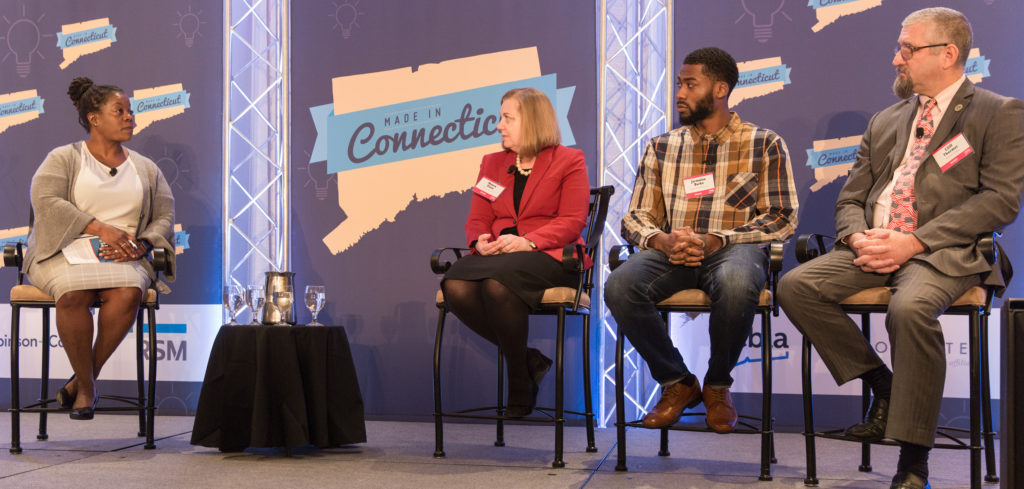Manufacturing Changed My Life’

Jermaine Burke’s path to a successful career as a machinist at Milford manufacturing company Balding Precision was an unconventional one, to say the least.
Burke was 21 when he was convicted on what he calls “very serious charges.” While serving 15 months in prison, he was exposed to a manufacturing program, learning skills that guided his way after he was released.

CBIA’s Andréa Comer with Electric Boat’s Maura Dunn, Balding Precision’s Jermaine Burke, and Goodwin College’s Cliff Thermer.
“As a youth, I didn’t really know what I was going to do,” Burke explains.
“Manufacturing changed my life.”
Burke, who went through Housatonic Community College’s Advanced Manufacturing Technology Center after leaving prison, shared his story during a workforce development panel at CBIA’s Oct. 26 Made in
Connecticut Manufacturing Summit in Trumbull.
Moderated by Andréa Comer, vice president of workforce strategies at CBIA’s Education & Workforce Partnership, the panel featured Burke, General Dynamics Electric Boat vice president of human resources and administration Maura Dunn, and Cliff Thermer, assistant vice president of strategy and business development at Goodwin College.
Skills Shortage a ‘Crisis’
Electric Boat has U.S. Navy contracts for 42 Virginia class and 12 new Columbia class submarines, to be delivered over the next 20 years, driving the company to develop a number of innovative workforce development programs.
“We have been under great scrutiny by the Navy because they’re not convinced Connecticut is big enough to have a workforce that will meet our requirements,” she said.
“Federal agencies see the manufacturing skills shortage as a crisis. They’re looking to business to take the initiative to lead the way.”
Dunn said EB is developing and expanding relationships with local communities, schools, and educators to meet its growing workforce needs.
Federal agencies see the manufacturing skills shortage as a crisis. They're looking to business to take the initiative.
"In the last three years we've found over 8,000 applicants that we wouldn't necessarily have found without those partnerships," she said.
"It's been incredibly successful. We're working with career and technical education school systems in both Rhode Island and Connecticut to build partnerships to expose more people to manufacturing.
"Re-aligning curriculum programs to meet manufacturing needs is a big part of that transformation."
'Team Connecticut'
Thermer also stressed the importance of collaboration between business, educational institutions, and the public sector.
"At the end of the day, it's Team Connecticut," he said.
"We're all in this together—business, education, government—and that's what makes manufacturing today so exciting."
Burke encouraged manufacturing companies to "think outside the box—you never know what you're passing up on if you don't give people a second chance."

Life-changing: Balding Precision machinist Jermaine Burke.
"Manufacturing gave me a second chance and I'm grateful for the opportunities I've been given," he said.
"It's important to spread the word across the state to give more people like me the opportunity."
Thermer said Burke's story illustrated how manufacturers must embrace partnerships and innovative thinking to find skilled workers.
"Life happens," he said. "Giving people a second chance, giving folks the opportunities that could pass them by is life-changing—and helps address manufacturing's workforce development needs.
"When a company comes into a school and tells students there's a real manufacturing job waiting for them—guess what, they start doing better, they compete.
"From an educational component, there are a lot of opportunities to partner, not only with students, but also with the community and manufacturers."
Apprenticeship Transformation
At Groton-based Electric Boat, the company is using older workers as trainers and has revived its long-dormant apprenticeship training program.
"We've had to take some our best people off the shop floor," said Dunn. "It hurts, but they have the magic in their hands to teach the next generation of workers as mentors.
"We discontinued our apprenticeship program for 20 years. Now, with the ramp-up in demand, we've reconstituted it through a partnership with the Connecticut Department of Labor."
Thermer said manufacturing apprenticeship programs were undergoing a transformation, with technical high schools and colleges now playing the role companies once performed.
https://twitter.com/CPTVOnline/status/1042097408036012033
"It's now the role of educational institutions to prepare students with the skills they need," he said. "It's a new type of apprenticeship.
"The community colleges have done an incredible job picking up the speed in training for manufacturing."
But Dunn said she still encounters teachers and counselors who are unaware of manufacturing's key role in Connecticut's economy and the challenging, rewarding careers the sector offers.
"We all need to work together to spread the message with passion, break down the silos, and get the funding and resources needed to meet our workforce needs," she said.
For more information, contact CBIA's Andréa Comer (860.244.1946) | @CTWorkforceTeam
RELATED
EXPLORE BY CATEGORY
Stay Connected with CBIA News Digests
The latest news and information delivered directly to your inbox.


